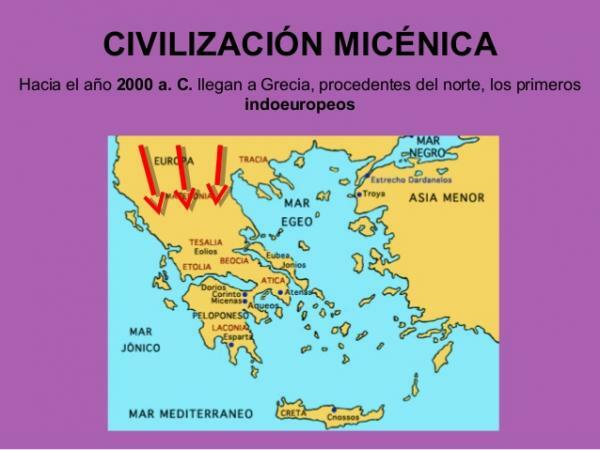Mycenaean Civilization: Brief Summary

Image: Globedia.com
When we talk about great classical civilizations We always usually refer to the best known such as Rome or Egypt, forgetting others that are equally important but have not been so well represented. One of these great civilizations of which we speak less is the Mycenaean whose influence has been vital for other important civilizations such as Macedonia or Athens. To know its great relevance, today in this lesson from a PROFESSOR we are going to offer you a brief summary of the Mycenaean civilization.
Mycenaean civilization has its origin in the pre-Hellenic epochi.e. at the end of the Bronze Age around 1600 and 1100 a. C. Its antiquity makes it considered the first great civilization of Greece continental, showing great development compared to other small regions in the area.
The origin is not known for sure of the Mycenaeans, there are theories that speak that they were Greek and others that call them Achaeans. It is thought that the people who founded the civilization defeated a small civilization that lived in the area and were assimilating their culture for decades. The study of the
Mycenaean language makes it more strongly related to the Greeks, since Greek languages such as Ionian are more similar to this language than to the characteristic dialects of the Achaeans.Civilization originated in the city of Mycenae, but after years of development they began a conquest of the nearby regions, dominating the small cultures that opposed them. Some of the centers of power that Mycenae achieved thanks to its conquests were Pylos, Thebes and Athens.

Image: Slideshare
To continue with this brief summary of the Mycenaean civilization, we must talk about the main characteristics of this culture in order to see how novel they were for the time and the great influence they had in later times.
Some main features were the following:
- Society was divided into king's men and in demos. The former dealt with administration, while the latter with tasks such as agriculture and crafts. Below both groups were the slaves.
- The leader of Mycenae was a king, who was called Anax. The king is the center of a set of palace networks, located in the most important cities.
- The leaders who commanded the palaces were from the warrior class, being the most powerful classes after the king.
- They traded in the Mediterranean with other civilizations, which is why Mycenaean remains can be found in Italy and Cyprus.
- They produced Mediterranean agricultural products such as wheat or olive trees.
- Some of the gods of mycenae They are the ones that Greece would later adopt, such as Poseidon or Zeus.
- Sacred temples for the gods began to be built.
- Appearance of the battle tanks, which would be important for the warlike future of the Greek peoples.
- Many of the greek myths are from this time, the best known being the trojan war.
- His writing system was Linear B, whose evolution would bring the arrival of classical Greek.

Image: Slideplayer
The end of the Mycenaean civilization took place in a short period of time, happening at the end of the Bronze Age. All this happened at a time of great splendor for civilization, when it dominated regions throughout mainland Greece, with great palaces.
It is not known with certainty what the reason was of the destruction of this civilization, but historians speak mainly of three possible causes. These causes are as follows:
- Invasions: It speaks mainly of the invasion of the Dorian peoples, these being the ancestors of the Spartans. The Dorians not only invaded Mycenae, but they conquered a large number of regions in southern Greece.
- Nature: Other historians think that the end of the Mycenaean civilization was due to natural causes. You think of a possible drought, or an earthquake. This theory is considered false, since it is complicated that a natural factor will destroy a civilization that had cities so far apart from each other.
- Internal conflict: It is thought of a struggle between the different classes within Mycenaean society, or between the different leaders of the palaces.



